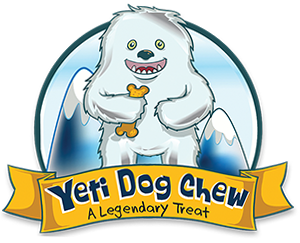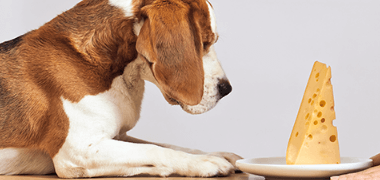Every dog owners knows that if you are in the kitchen, cutting off a chunk of cheddar cheese or cubing up some Colby, you are likely to have your fur baby right by your side hoping to get a bite of that tasty cheese.
Even a study of the University of Michigan has discovered that cheese addiction is real. And simply put, dogs are no exception in their love and appreciation for cheese — they just can't resist it and neither can we resist those begging puppy eyes. 
Is Cheese Good or Bad for Dogs?
The short answer is that cheese alone is non-toxic to dogs, but it depends on your dog’s individual sensitivities whether you should feed it to them. Cheese is great for the health and growth of dogs if fed in moderation. It contains vitamins and minerals, such as calcium, Vitamin A, B-complex vitamins and essential fatty acids. Newer studies indicate that cheese may actually re-mineralize your dog’s teeth and reduce acids that cause plaque and lead to cavities. It also helps to protect your aging dog from osteoporosis. Cheese can also be used as an occasional treat for dogs while training.
Some dogs react really well to cheese, other dogs may be lactose intolerant and cheese and dairy, in general, may give them stomach upsets. Lactose is the primary reason for indigestion in dogs. Observe your dog closely for signs of intestinal upset after feeding her cheese for the first time. If your dog reacts badly, you can consult with your vet and potentially remove it from their diet. As long as they don’t react badly, there is no reason not to give your dog cheese on occasions.
However, you should avoid feeding your dog cheese that are high in sodium. Giving too much sodium or salty food to your dog, in general, can cause high blood pressure, which unfortunately could eventually lead to an organ damage. It might be wise to have your dog skip the blue cheese, cheddar, parmesan cheese, feta cheese, all grilled cheeses and cheeses on pizza because they’re very salty. On the other hand, you can go for cottage – it’s low in sodium and fat, which makes it the perfect addition to your dog’s diet.
If you’re thinking of adding cheese to your dog’s training treat or looking to keep your dog engaged for some time, you can consider our chews or treats that are made from 100% natural himalayan yak and cow milk-based hard cheese. It contains less than 1% of fat content and is also free of lactose, making it a safe alternative to any sensitive canine.
Learn more about “How Yeti Dog Chew is made”

